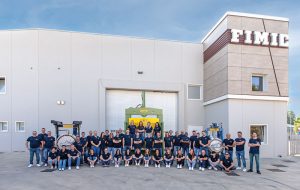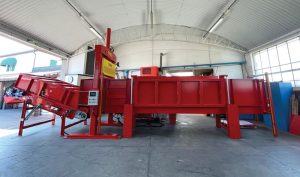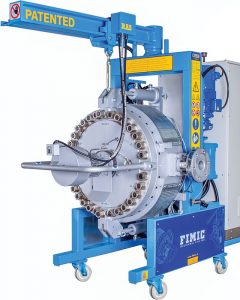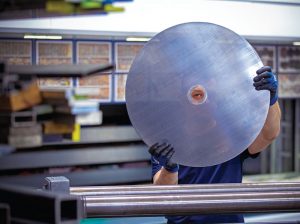
FIMIC technology provides solutions that eliminate impurities and lead to efficiently processed, high quality recycled products.
TW Special Report
FIMIC S.r.l., a family-owned company based in northeastern Italy, has a rich history in recycling technology that spans over more than six decades. Located in Carmignano di Brenta — in the Veneto region of Italy about 30 miles northwest of Venice — FIMIC initially focused on manufacturing guillotines for cutting industrial waste bales and rolls. This initial focus was just the beginning of a long history assisting companies with innovative recycling technologies.
Guillotines Endure
FIMIC’s early success manufacturing guillotines continues today, building on a reputation for robust, long-lasting, low maintenance machines that feature Italian craftsmanship and technology that has reinforced its status as FIMIC’s “flagship” equipment.
Today, two lines of guillotines are available, focused on different kinds of materials and cuts necessary to meet customer’s specifications. According to the company, a significant feature is the level of customization — with virtually no two guillotines the same.

Improving Plastic Filtration
In 1996, FIMIC saw an opportunity to solve a problem in melt technology and further support the needs of not only its guillotine customers, but also the growing demand from plastics recyclers for an automatic filtration system. Melt filtration technologies available at the time were improved with FIMIC’s development of the first FIMIC backflush filter.
A year later, FIMIC’s “scraping” system was added to further advance melt filtration technology.
With these innovations, FIMIC started to make history in the plastics recycling industry and became known as a specialist in automatic self-cleaning melt filters with an eye toward simplicity, optimization, flexibility, and performance.

Five Filters
FIMIC currently supplies five different types of filtration with five filter models. This offering provides a range of technology for the diverse needs of the industry.
According to the company, the RAS scraping filter system is known for its flexibility and strength. Using two blades, it can scrape very highly contaminated polymer flows and reprocess both, post-industrial and post-consumer materials with an adjustable discharge valve system.
The amount of waste produced by the melt filter can be adjusted through a special FIMIC valve, automatically opened when necessary, according to the level of melt contamination. As a result, the waste flow is proportional to the amount of contamination; in the event of a particularly clean melt, the valve will stay shut, and discharge just the little amount of waste filtered.
Following the development of the RAS filter, the ERA filter was introduced to address the needs of double filtration applications, conserving investment and consumption by performing the double filtration step in a single machine with two consecutive filtration chambers.
The RAS+REF melt filter that distinguishes FIMIC technology in the recycling field offers enhanced functionality with a backflush mode, and can operate in two different ways — in backflush mode or scraping mode. This provides clients who wish to process materials with mesh filters with more options.
The addition of the TEN model melt filter, which features the innovation of the first automatic screen changer allows, continuous filtration on woven mesh, eliminating material build-up and reduction of output with the additional option of adjusting the mesh output to ensure consistency and quality. The TEN doesn’t need the constant supervision of the operator simplifying the process.
The Gem
In response to the considerable amount of material to be recycled today, and the demand for high-quality end products, FIMIC also designed a unique melt filter, representing the culmination of its technology and the expertise that made the company filtration specialists.
The GEM is a twin melt filter with an unmatched filtering surface that utilizes just two parallel filtering screens.
The GEM is proven as a leading technology in today’s market that is ideal for high-throughput recycling line applications, according to FIMIC.
Building In Efficiency
FIMIC’s focus on designing and manufacturing self-cleaning, automatic melt filters that improve production line efficiency and output quality has been center stage for the company’s positioning in the marketplace.
FIMIC’s melt filters feature quick operation, with screen changes completed by a single operator in less than 30 minutes. This efficiency minimizes production down time and can optimize workflow.

Better Pumping Technology
Pumping plastic materials in the recycling process can be a maintenance challenge for processors. Standard gear pumps are sensitive machines that can be easily damaged by contamination and demand significant maintenance and periodic gear replacement.
In addressing these issues, FIMIC developed the SPA screw pump — a pump that doesn’t need gear changes, operates at lower management costs and is not as sensitive to contaminated material.
According to the company, the SPA screw pump also can be used both before and after the filter and is appropriate for double filtration needs.
FIMIC says the SPA pump has a strong operating speed, is easy to operate, demands little maintenance and has a long service life.
Textile Applications
Despite its long history focused on plastic recycling, FIMIC understands the huge importance of recycling in the textile marketplace, as well as the wide variety of possible textile applications for its technologies.
In the current plastic/textile recycling environment, the focus is on two main applications — polyester (PET) fibers, and polypropylene (PP) fibers and tapes. These very challenging applications require high-quality, reliable technologies at every step of the way.
According to FIMIC, the PET fiber manufacturing market is facing serious market issues, one of them being the high prices of hot-washed PET flakes, now destined for higher-end applications like food contact thermoforming or bottling.
For this reason, fibers producers cannot use solely PET flakes as a raw material, but also need to use lower-grade PET waste such as lumps and waste fibers themselves. PET lumps can be highly contaminated which cannot logically be washed away in a washing line.
That’s where FIMIC’s filtration technology can help the most — to act as a pre-filter to remove the majority of contaminates and prepare a well-filtered melt to the following steps of the processing line.
With PP textiles, an extremely interesting application is in PP woven bags, or flexible intermediate bulk containers (FiBC), whose woven tapes are made of recycled polypropylene (rPP).
This is a very demanding application, especially starting from post-consumer PP woven bags, that often are heavily contaminated and need specialized machinery from experienced suppliers to complete the process.
FIMIC can contribute here with two technologies to improve the efficiency of such process
The guillotine — at the very beginning of the line — can be used to pre-cut the bales of PP woven-bags and prepare them to be fed to the subsequent washing steps.
Secondly, FIMIC’s Melt Filtration technology — single or double —may be used to remove many contaminants from the melt stream, hence helping to obtain a high-quality, unstressed polymer, and very well filtered melt that can be pelletized to be reused into rPP tapes production.
Looking Forward
With a rich history serving recyclers needs for innovative solutions, FIMIC finds itself deeply ensconced in an industry of increasing demand.
From humble beginnings focused on assisting in processing waste —the industry is no longer discarding waste but transforming it in a circular product environment. FIMIC has proven to be an effective partner in various stages of the recycling process, and its portfolio of equipment is recognized for its reliability and in its word “unbreakable.”
With the growing interest in recycled plastics and a need to process highly contaminated plastic waste, FIMIC technology provides solutions that eliminate impurities and lead to efficiently processed, high quality recycled products. As recycling continues to remain top of mind, FIMIC’s ability to contribute look more constructive than ever.
2025 Quarterly Issue I




